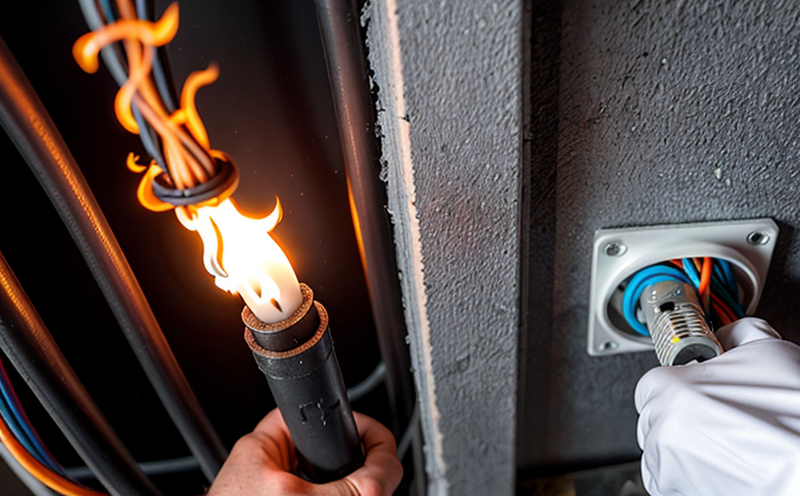BS 7211 Fire Performance of Insulated Cables
The British Standard BS 7211:2013 specifies the methods for determining the fire performance of insulated cables. This standard is crucial in ensuring that electrical and electronic equipment installed within buildings, particularly those used in high-risk environments such as hospitals, data centers, and aviation facilities, can withstand potential fire hazards without compromising safety or integrity.
BS 7211 involves a series of tests aimed at assessing the ability of cables to resist ignition, flame spread, and smoke production when exposed to fire. The standard covers both single-core and multi-conductor cables and is applicable to various types of insulation materials including PVC, XLPE (Cross-linked Polyethylene), rubber, and others.
The testing process under BS 7211 typically involves the following steps:
- Preparation of the cable samples: This includes cutting representative specimens from the cables to be tested. The length and diameter are chosen based on the type of cable being evaluated.
- Initial examination: Before testing, each specimen undergoes an initial inspection to ensure it meets basic quality criteria set by the standard.
- Testing in a controlled environment: Specimens are subjected to specific fire conditions, such as exposure to open flames or gas burners. The test setup can vary depending on whether the cable is single-core or multi-conductor.
- Evaluation of performance metrics: After testing, parameters like flame spread rate, smoke production level, and heat release are measured and recorded.
The results from these tests provide critical data that helps determine the fire resistance rating of the cables. Compliance with BS 7211 is mandatory for manufacturers aiming to sell their products in the UK market or other regions where this standard is accepted as a benchmark for quality and safety.
For R&D engineers, understanding these tests can be instrumental in developing new cable designs that not only meet regulatory requirements but also enhance overall system performance. Compliance officers must ensure suppliers adhere to such standards to maintain company reputation and avoid legal issues associated with non-compliance.
Quality and Reliability Assurance
The process of testing cables according to BS 7211 ensures consistent quality across production batches, thereby enhancing reliability in critical applications. By conducting these tests, manufacturers can identify potential weaknesses early in the development cycle, allowing for timely corrections before large-scale production begins.
Quality managers play a key role in overseeing this process by ensuring that all test procedures follow precise protocols outlined in BS 7211. This not only enhances product safety but also builds trust with clients and end users who rely on dependable electrical infrastructure.
In terms of reliability assurance, the results from these tests can be used to predict how different cable types will behave under real-world fire conditions. Engineers often use historical data collected through BS 7211 testing to inform design decisions aimed at improving both safety margins and operational efficiency.
International Acceptance and Recognition
Bs 7211 enjoys widespread recognition not only in the UK but also internationally, especially within industries that demand stringent fire safety measures. Many countries have incorporated elements of BS 7211 into their national standards, recognizing its importance for safeguarding public spaces.
For instance, ISO (International Organization for Standardization) has referenced parts of BS 7211 in several international documents, further validating its relevance globally. This cross-referencing underscores the standard's authority and reliability among professionals worldwide.
The acceptance of BS 7211 by major industry bodies like IEC (International Electrotechnical Commission) ensures that manufacturers can confidently export their products to various markets without encountering regulatory barriers. Recognized compliance with this standard also boosts brand reputation, making it easier for companies to gain market share.
Environmental and Sustainability Contributions
- Better fire performance of cables can lead to reduced risk of fires in buildings, which is beneficial for the environment as it minimizes damage to structures and contents.
- Cables that meet BS 7211 standards are designed with materials that are less likely to contribute to toxic smoke or gases during a fire event.
- By enhancing safety through these tests, there is an indirect positive impact on energy consumption since fewer resources need to be allocated for emergency response and recovery operations following incidents.





